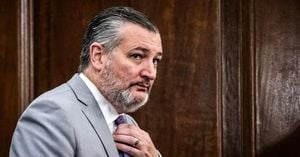Washington, D.C. is once again at the center of a political and cultural storm, as President Donald Trump’s administration takes dramatic steps that critics say threaten both the city’s autonomy and the integrity of federal data relied upon by the nation and the world. In a week marked by sweeping federal intervention and deepening distrust, the White House’s moves have reignited debates over race, democracy, and the very credibility of American institutions.
On August 11, 2025, Trump announced a federal takeover of D.C. law enforcement, deploying the D.C. National Guard in response to what he described as a wave of violent crime. “Our capital city has been overtaken by violent gangs and bloodthirsty criminals, globing mobs of wild youth, drugged-out maniacs and homeless people, and we’re not going to let it happen anymore,” Trump declared at a press conference, as reported by CNN. He also singled out other cities with predominantly Black populations and Black mayors—Chicago, Los Angeles, Oakland, and Baltimore—claiming they too were plagued by crime. Baltimore Mayor Brandon Scott, speaking to CNN’s Laura Coates, called out what he saw as a racial double standard: “It’s very notable that each and every one of the cities called out by the president has a Black mayor.”
This federal intervention in D.C. comes against the backdrop of a long struggle for self-governance and representation. As Denise Oliver-Velez, editor for Black Kos, recalls, D.C. residents only gained the right to elect their own mayor and council in 1973 with the passage of the D.C. Home Rule Act—a hard-fought victory rooted in civil rights activism. Before that, Congress and federally appointed commissioners ran the city, often ignoring the will of its majority-Black population. “The D.C. Home Rule Act of 1973 ultimately passed as a compromise between D.C. residents who wanted full democratic rights and members of Congress who wanted to maintain power over D.C. and its majority Black population,” Oliver-Velez writes, referencing the District of Columbia ACLU’s history of the movement.
Yet, even this compromise left Congress with ultimate authority over the city’s laws and budget, and D.C. residents still lack voting representation in Congress. The struggle for full statehood and equal rights remains ongoing, led by organizations like the DC Statehood Party, Stand Up! for Democracy in DC, and DC Vote. The denial of full statehood, as Oliver-Velez notes, is deeply rooted in racism, with Congress stripping the city’s elected government in 1874 as Black political influence grew. The Free DC movement of the 1960s and 70s, co-founded by civil rights leader Marion Barry, helped restore some local control, but the fight for equality continues.
Trump’s latest actions have reignited fears that federal control could roll back hard-won gains. Local protests erupted this week, with the Free DC movement holding demonstrations on Monday, demanding respect for D.C.’s autonomy and denouncing what they see as racially motivated targeting of Black-led cities. The conversation is not just about policing or crime—it’s about who gets to govern, whose voices matter, and whether democracy in the capital is real or symbolic.
Meanwhile, another Trump administration decision has sent shockwaves through the world of economic policy. On August 12, 2025, Trump fired the commissioner of the Bureau of Labor Statistics (BLS) after the agency published unemployment data showing employment flagging under his regime. He tapped E.J. Antoni, a Heritage Foundation economist and contributor to the controversial Project 2025, to lead the BLS. In an interview aired on Fox News, Antoni called for the suspension of monthly job reports, citing concerns about their accuracy. “How on earth are businesses supposed to plan – or how is the Fed supposed to conduct monetary policy – when they don’t know how many jobs are being added or lost in our economy? It’s a serious problem that needs to be fixed immediately,” Antoni told Fox News Digital. He advocated for publishing only quarterly data, which he argued is more accurate, though less timely.
Antoni’s appointment and his proposed changes have sparked alarm among economists and policymakers. As Robert Hormats wrote in Time, the BLS has long been a non-political institution, its data forming the backbone of decisions by the Federal Reserve, investors, and governments worldwide. “The information provided by the BLS Commissioner simply relies on data from a wide range of non-political and highly credible civil servants,” Hormats explained. The fear is that politicizing the BLS undermines confidence in U.S. economic data, with far-reaching consequences for American prosperity and global trust. “The credibility of the American government’s most fundamentally important data, and its word on major issues, is critical both to American prosperity and to allied confidence,” Hormats warned.
While the Senate must confirm Antoni’s appointment, skepticism abounds about whether lawmakers will resist Trump’s pick. Recent history suggests little appetite for confrontation, leading many to expect Antoni will soon take the helm of the BLS, further eroding the agency’s independence.
These developments are not occurring in a vacuum. They are part of a broader national conversation about race, democracy, and the future of American institutions. Racial disparities persist across education, healthcare, employment, and criminal justice, disproportionately affecting Black men and boys. Yet, as highlighted by the Brookings Institution’s Wellness in Black Life (WIBL) project, Black communities are also leading efforts to define and achieve well-being on their own terms. On August 20, 2025, the WIBL project will host a panel in Washington, D.C., bringing together community members and researchers to discuss solutions rooted in social connection, economic opportunity, family structure, and mental health. According to research from Columbia University, Black men are 20% more likely to experience serious psychological distress than white men, yet far less likely to receive treatment. Suicide rates remain especially troubling, underscoring the need for community-driven approaches to wellness.
Amid these challenges, the cultural legacy of Black writers and thinkers continues to inspire. The late-career essay collection by Jamaica Kincaid, Putting Myself Together: Writing 1974–, serves as a reminder of the enduring power of Black voices to confront injustice and imagine new possibilities. As the commentary in Black Kos reflects, the struggle for justice and dignity is ongoing, rooted in both historical memory and present-day activism.
As Washington, D.C. faces renewed federal intervention and questions swirl about the reliability of official data, the city’s history of resilience and resistance remains as vital as ever. The debates playing out in the capital are not just about policy—they are about the soul of American democracy and the fight for a future in which all voices are heard and respected.




